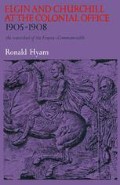Abstract
Most Liberal ministers believed generally in the desirability of maintaining, as far as possible, continuity of external policy through changes of government. By 1905 a `bi-partisan’ foreign policy was virtually established. Shortly before the new Liberal government took office in December 1905, Sir Edward Grey emphasised the need for continuity of foreign policy. He would not say that they were always bound at all costs to advocate continuity, but at that time he thought it important to adhere to the principle, if only to reassure foreign governments that Britain was a trustworthy and reliable friend.1 Shortly after taking office, Sir Henry Campbell-Bannerman emphatically reaffirmed his adhesion to the policy of the Entente Cordiale.2 Despite his dislike of some features of Unionist foreign policy, particularly the renewed AngloJapanese Alliance (a dislike shared by Ripon and Morley),3 no fundamental changes occurred during his ministry. Indeed the Liberal government actually extended the principles laid down by their predecessors and soon began working for an agreement with Russia, to the disgust of their Radical supporters.
Access this chapter
Tax calculation will be finalised at checkout
Purchases are for personal use only
Preview
Unable to display preview. Download preview PDF.
Footnotes
Sir E. Grey, Speeches on Foreign Affairs 1904–1914, ed. P. Knaplund (1931), p. 31. Once in office he did indeed take the principle seriously.
C. Headlam, ed., The Milner Papers — South Africa 1897–1905 (1933), ii, 187; Haldane to Milner, 31 Mar 01.
F. Maurice, Haldane (1937), i, 119; Haldane to Rosebery Aug 02.
S. Gwynn and G. M. Tuckwell, Life of Sir Charles Dilke (1918), i, 68; CB, Speeches, p. 148.
H. A. L. Fisher, James Bryce (1927), i, 24;
H. Samuel, Liberalism, its principles and proposals (1902), pp. 323 and 335;
W. S. Churchill, Liberalism and the Social Problem (1909), p. 122, speech, 15 Jul 07.
H. Samuel, Memoirs (1945), p. 33.
Author information
Authors and Affiliations
Copyright information
© 1968 Ronald Hyam
About this chapter
Cite this chapter
Hyam, R. (1968). The Liberal Ministry and the Empire. In: Elgin and Churchill at the Colonial Office 1905–1908. Palgrave Macmillan, London. https://doi.org/10.1007/978-1-349-00213-9_4
Download citation
DOI: https://doi.org/10.1007/978-1-349-00213-9_4
Publisher Name: Palgrave Macmillan, London
Print ISBN: 978-1-349-00215-3
Online ISBN: 978-1-349-00213-9
eBook Packages: Palgrave History CollectionHistory (R0)

